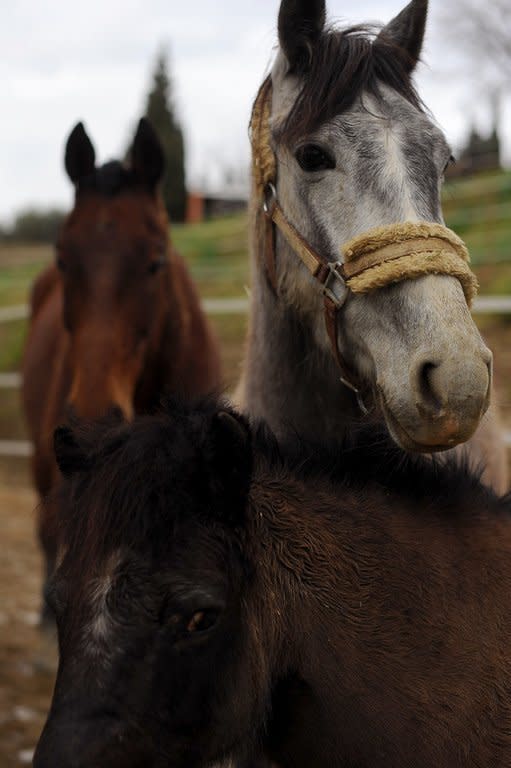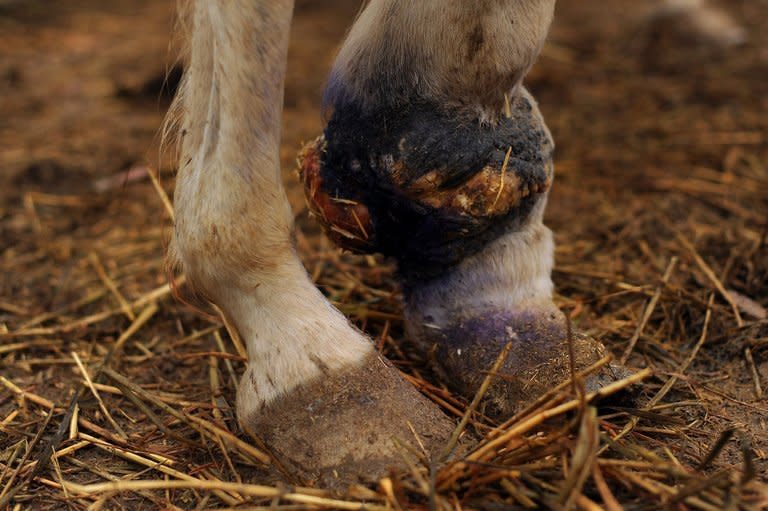Abandoned status symbols, horses perish in Spain
In Spain's boom years, they were a rich family's status symbol. Now abandoned as a result of the economic crisis, horses are plodding in their tens of thousands to the slaughterhouse. At the end of a bumpy country lane in southern Andalucia, Spain's farming and horse-rearing heartland, Virginia Solera helps run a shelter for the luckier cast-offs -- victims, along with millions of citizens, of Spain's abrupt economic downturn. "A few years ago we were rescuing horses in isolated cases, ones that were mistreated or abandoned. Now the problem is happening in all sectors," from private owners to professional breeders, said Solera at her shelter in the village of Alhaurin el Grande. "In Spain, having a horse is a sign of wealth," said Solera, stroking one of the shelter's 55 inhabitants: Alegria, a bay mare found starving a few months ago. "A few years ago, before the crisis, a lot of people thought: I'll buy a big car, a big house and why not a horse?" she added. The boom years particularly marked Andalucia. Many people left the fields to work in the flourishing construction industry and were left washed up when the property bubble burst in 2008. While people in the region struggle to get by, abandoned horses are perishing, "dying of hunger or going to the slaughterhouse", said Solera. The Spanish government says the number of horses slaughtered in abattoirs has doubled since 2008, with 60,000 killed in 2012. Some, like Alegria (which means joy in English), arrive at the shelter with their teeth damaged from grubbing around in the ground for food. Another horse at the shelter, Estrella, has an open wound on her front left hoof from where her owners dragged her by a rope to try and tame her before abandoning her, crippled. Virginia says other owners leave horses tethered in floodable areas in the hope they will drown, or shut them up and leave them to starve. Not far away, rain rattles the metal roof of the stables kept by horse dealer Manuel Gonzalez Melendi, 68. He points proudly to an eight-day-old foal tottering on its young legs in the wild grass. It is one of a dwindling stock. "There used to be lots of horses here, 50, 60, even 100. I used to buy and sell them. That's how I made my living," said Gonzalez said. His stable has since shrunk to a handful. "The way things are now no one is buying them, the feed is expensive and no one wants a horse, so I've had to stop," he said. "I've sold some cheap and the others have gone to the slaughterhouse." Manuel Gonzalez, secretary general of the Spanish slaughterers' and meat-processors' association Aprosa, has seen the trend grow. "In the economic boom years in Spain lots of families acquired a horse or went riding with the family at the weekend. There was a big rise in it about eight years ago," he said. "It was good business. People rode at riding schools and stables for leisure," he added. "That business isn't a business anymore. The horses cost a lot of money to keep and people who own them have to send them to the slaughterhouse." Gonzalez says looking after a horse can cost 400 euros a month. Now many owners are cutting their losses by sending them to the slaughter in return for around 150 euros cash per horse. Horsemeat, source of a Europe-wide food scandal over recent weeks, is not popular in Spain, so 90 percent of the slaughtered beasts are exported, mostly to France and Italy, Aprosa says. "Everyone is taking advantage of the crisis to get rid of things they don't want, things they once took responsibility for," said Solera. "They try to hang onto the car and the house, but not the horse. The horse they just get rid of."





